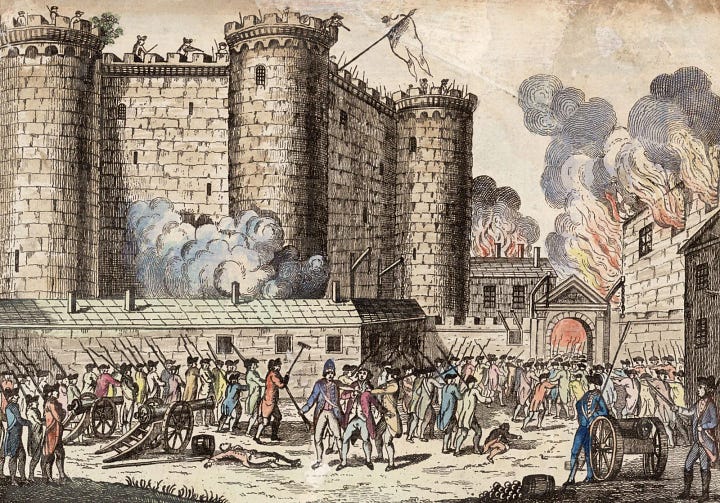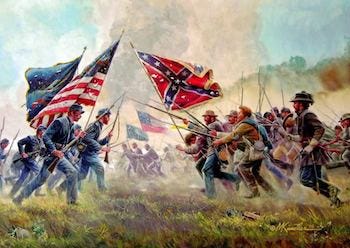HISTORY YOU NEVER KNEW: How The French Revolution And American Civil War Helped End The Ottoman Empire


I love history for many reasons. One reason is that a significant historical event often triggers a chain reaction that leads to other historical events on the opposite side of the world later, despite the two parts of the world being far apart. I find that fascinating. I will explore some of these events in my upcoming few essays in my HISTORY YOU NEVER KNEW series. We’ll start with how the French Revolution and American Civil War, two significant events that led to substantial societal shifts in the West, actually helped bring down an empire in the East.
The Fall of the Ottoman Empire in the early 20th Century was a long time coming. For nearly 600 years, the Ottoman Empire was the largest Muslim empire in the world. At one point stretching from the Persian Gulf to the gates of Vienna, from the Sahara Desert to the Caucasus Mountains of modern-day Russia, the empire, with its capital in Constantinople – now Istanbul – was the only non-Christian one to hold significant territory in Europe after the fall of Rome.
After reaching its peak in the 17th Century, Ottoman forces were defeated in their attempt to take Vienna in 1683, and the empire gradually lost territory thereafter. Internal strife and ongoing conflicts with Persia and Russia eroded its power. However, it was two events in the late 18th and mid-19th centuries, thousands of miles away from the Ottoman Empire, that ultimately dealt the final blows.
When a mob of peasants stormed the Bastille in Paris in July 1789, a little more than a century after the Turkish defeat of Vienna, 1,400 miles away in Constantinople, Sultan Selim III was still searching for paperclips in Topkapi Palace.
Having inherited the Ottoman imperial throne from his uncle just three months earlier, Selim took control of a fledgling empire. The conflict with Russia, which had begun to see itself as the protectors of occupied Christians in the Balkans and the rightful heirs to the Byzantine Empire,1 led the Ottomans to rely on their only European ally at the time for economic aid, military support, and training - France. The French Revolution put that at risk.
Their alliance began in the early 16th Century during the Italian Wars, when the Habsburg Charles V, the Holy Roman Emperor and King of Spain, captured King Francis I of France in battle. Charles’ maternal grandparents, Ferdinand and Isabella, are the ones who drove the Muslims out of Spain and triggered the Spanish Inquisition, so it isn't too much of a surprise that he wasn’t popular with the Ottomans. Thanks to his parents, Joanna of Castile and Philip of Habsburg, Charles inherited both the Spanish throne and the Holy Roman Empire, which encompassed much of Central Europe. His dominations surrounded France on all sides, forcing Francis into a conflict with him to protect French interests near its borders.
After being captured, Francis was imprisoned in Madrid, and Francis’ mother, Louise of Savoy, who was governing in Paris, sought allies. Charles had relied on strategic diplomatic marriages to starve the French of potential allies. In England, Charles’s aunt, Catherine of Aragon, was the queen consort. In Portugal, another potential French ally, Charles’s sister, another Catherine, reigned as queen consort.
Desperate, Louise sent an envoy to Constantinople to negotiate an alliance against Charles. The Turks were interested in the partnership in part because they hoped to reclaim land in Europe that had been lost to Charles’ grandparents.
Over the centuries, the Turks and the French maintained an alliance that evolved into an economic and military partnership. France sent troops and supplies to the Turks for their wars against the Persians and battles against the Poles and Russians on the empire’s northern border.
Then the French monarchy was overthrown. The economic and military aid to the Ottoman Empire dried up. Initially, Selim III utilized the crisis caused by the loss of aid to promote reforms in the Turkish military; however, the loss of a key European ally only exacerbated the empire's decline, which was already long past its prime.
Having seized control of the Mediterranean from the long-time Ottoman enemy, the Republic of Venice, Napoleon invaded Egypt and meddled in Ottoman affairs. It was the Mamluks, the rulers of Egypt under the Ottoman Empire, who defeated Napoleon, with the support of the British. However, Napoleon’s conquest revealed the Ottoman Empire to be weaker and more factionalized than most Europeans had thought, weakened in part by the loss of France as a vital partner. A half century after the French Revolution, Tsar Nicholas I of Russia coined the phrase “Sick Man of Europe” to describe the faltering Ottoman Empire.
Christians living in the Balkan Peninsula saw an opportunity to drive out their Turkish occupiers, who had ruled over them for hundreds of years. Within a quarter century of Napoleon’s invasion of Egypt, the Greek Revolution, inspired by the French Revolution, sparked an independence movement that led to the modern-day nation of Greece. This was a significant blow to the Ottoman Empire, which also got drawn into another war with Russia in the mid-19th Century over Crimea - a war Turkey lost.
Meanwhile, in Egypt, the economy experienced significant growth in the 1860s, primarily driven by the expansion of the cotton trade. The American Civil War and the abolition of slavery in the United States cut off the flow of cheap cotton from the American South to Europe. Egypt provided them with a fresh source of cheap cotton, and the economy boomed. It then suffered once the cotton flow from the United States resumed after the war. During this period, the British became much more economically and culturally invested in Egypt, having helped them defeat Napoleon decades earlier. They instigated long-standing rivalries between the Ottoman vasal rulers of Egypt and the central government in Constantinople.
The British, at the height of their imperial ambitions and sensing an opportunity in the Nile Delta, exacerbated the animosity between Egypt and the Ottomans,2 which ultimately led to Egypt's secession from the Ottoman Empire and its transformation into a British vassal state, and the further contraction of the once-powerful European empire. Motivated by the rise of abolitionism in the West, the British pushed abolitionism on the Ottomans, which triggered revolts in the Arab lands where slavery was seen as a religious right. This planted the seeds of Arab animosity toward the ruling Turks that ultimately led to the Arab Revolt during World War I.
In 1914, the Ottoman Empire entered World War I, siding with Germany and Austria-Hungary. Upon its defeat in 1918, it began the process of disintegration. Its former possessions in the Middle East were divided between France and Britain, and new independent Arab kingdoms emerged, while its Balkan possessions became independent states, such as Albania, Yugoslavia, and Bulgaria. The heart of the empire in Anatolia became modern-day Turkey. The empire, fatally damaged by the loss of French military and economic support after the French Revolution and by British intervention in Egypt, caused by the disruption of the cotton trade caused by the American Civil War, was finally no more.
Catherine the Great even named her grandson Constantine after the the Roman Emperor who founded Constantinople because she believed Russia would eventually reconquer the city for the Christians and he would become the new Emperor.
The conflict between Egypt and the Ottomans was the cause of the 1834 Peasants Revolt in Palestine, where the local population revolted against being forced by Egypt to fight against the Ottomans. This is considered one of the founding events that formulated Palestinian national identity.





